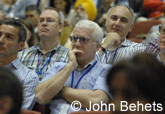Interview Technique
What difference will you make?
Organisations are interested in results, so show what difference you've been able to make in your career so far and have ideas as to what difference you could make for your prospective employer.
When preparing for the interview, consider what questions might arise to probe these four areas and work out a structured response. One very useful structure for answering interview questions is known as the STAR technique i.e.
- S = Situation: concisely describe the problem/challenge you faced.
- T = Task: briefly explain what needed to be achieved.
- A = Action: explain what YOU actually DID.
- R = Result: describe the result ie what you achieved and what the benefits were for the organisation.
Also, have two or three questions of your own – enough to show you’re interested but not so many the interview panel start looking at their watches.
If a post isn’t too well paid you could conceivably be worse off financially by working if you were receiving a high level of Benefits - and getting back on the same Benefits after going back to work isn’t always easy.
However, the longer you’re out of work the longer you are likely to remain out of work, as employers usually prefer someone with recent work experience. If you’re reasonably confident you’ll make a go of it, returning to work will usually pay off over the longer term.
Pensions
The NHS final salary pension is one of the best around, so the normal advice would be retain it and start a new pension with your new employer. For more information on pensions generally, check: www.pensionsadvisoryservice.org.uk and www.direct.gov.uk/en/Pensionsandretirementplanning/index.htm.




